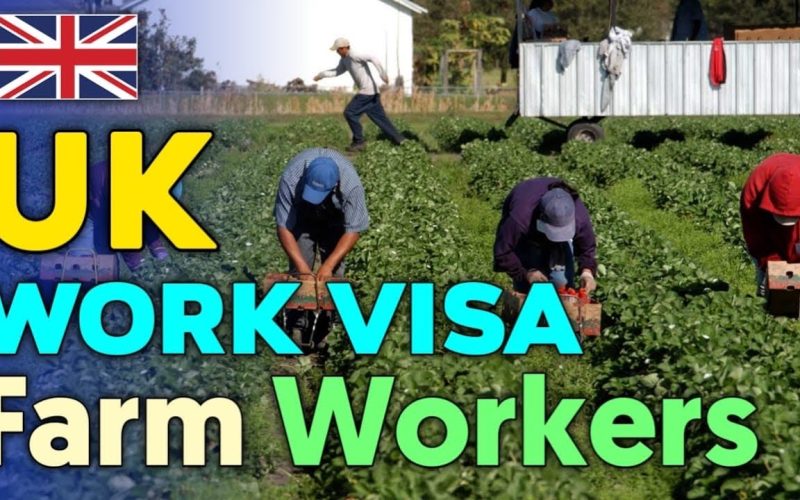The agricultural sector in the United Kingdom (UK) is a crucial pillar of the national economy, driving food production and supply while creating thousands of job opportunities.
From fresh produce and grains to livestock and dairy products, the demand for UK-grown agricultural goods continues to grow, underscoring the need for a robust workforce. For immigrants, farm jobs in the UK offer a gateway to stable employment with visa sponsorship, allowing non-UK citizens to legally work and reside in the country.
This not only meets the high labor demands in agriculture but also offers a well-structured and regulated environment for workers from around the world.
In the UK, farm jobs span a wide variety of roles, from hands-on work in fruit picking and packing to specialized positions in animal husbandry and machinery operation. Visa sponsorship is a major advantage for immigrants, providing them with legal permission to contribute to the UK’s agriculture sector. This guide will walk you through everything you need to know about farm jobs with visa sponsorship in the UK, including key entry-level skills, necessary certifications, high-paying regions, and salary expectations.
Essential Skills for Farm Jobs with Visa Sponsorship in the UK
Farm jobs, particularly entry-level positions, are accessible to workers with minimal prior experience. However, certain skills are highly valued by employers and can increase your chances of securing a role. Below are some of the core competencies sought after in UK farm jobs:
- Physical Fitness and Stamina: Farming is often physically demanding, requiring workers to perform tasks like lifting, carrying, and operating heavy equipment. A good level of physical fitness and stamina is essential, especially during peak seasons.
- Adaptability and Willingness to Learn: Many agricultural tasks involve specialized techniques, such as machinery operation or animal care, which require on-the-job training. Employers value workers who are eager to learn and can quickly adapt to different roles as needed.
- Teamwork and Communication Skills: Farm work usually operates within a team structure, where workers coordinate with others to maintain efficiency and productivity. Good communication and interpersonal skills are crucial for a smooth working environment.
- Time Management and Organization: Some farming tasks, like harvesting, need to be completed within specific time frames to preserve crop quality. Workers who can manage their time well and handle tasks independently are valuable to farm operations.
- Basic English Proficiency: While advanced language skills may not be essential, a basic understanding of English is often required for effective communication, especially when following safety instructions.
These entry-level skills not only make candidates more attractive to employers but also improve the likelihood of securing a farm job with visa sponsorship.
Certifications to Enhance Employability in UK Agriculture
While many farm jobs in the UK do not require formal qualifications, certain certifications can enhance employability, particularly for specialized roles. Below are common certifications that can give candidates a competitive edge:
- First Aid Certification: Due to the physical nature of farm work, minor injuries can occur. First aid certification is advantageous as it enables workers to address injuries or emergencies on-site, contributing to a safer workplace.
- Health and Safety Certification: Familiarity with health and safety regulations is important. Completing a course through the Health and Safety Executive (HSE) or similar programs in the UK prepares workers to follow safety protocols effectively.
- Pesticide Application (PA1/PA2 Certification): For roles involving the use of chemicals in crop farming, a PA1/PA2 certificate is often required by law. This certification assures that workers are trained to handle pesticides safely.
- Driving and Machinery Operation Certification: Many farms require workers to operate heavy machinery, such as tractors or forklifts. Having a driver’s license or specialized certification for machinery operation is highly beneficial.
- Animal Care Training: For jobs involving livestock management, training in animal care is useful. This includes feeding, handling, and administering basic care to animals.
These certifications not only prepare workers for the job but also signal to employers that candidates are committed to following safety and quality standards.
Top UK Regions with High-Paying Farm Jobs
The pay for farm jobs in the UK varies by region, type of farm, and the specific role. Here are five regions in the UK that are known for offering competitive wages in agriculture:
- East Anglia: Known for arable farming, East Anglia specializes in grain and vegetable production. Due to the demand during harvest, farm workers in this region earn between £10-£12 per hour, with potential for overtime.
- South East England: South East England has many fruit farms and vineyards. Wages here are slightly higher due to the demand for seasonal labor, with workers earning £11-£13 per hour.
- West Midlands: A hub for dairy and livestock farming, the West Midlands offers wages of £9-£11 per hour. Some farms provide accommodation, which can be a valuable benefit for immigrant workers.
- Yorkshire and the Humber: With expansive farmland, Yorkshire is a hotspot for both crop and livestock farming. Workers here can expect to earn around £10-£12 per hour, with potential bonuses during busy seasons.
- Scotland: Scotland’s agricultural sector is diverse, covering both arable and livestock farming. Due to the sometimes challenging working conditions, wages can range from £11-£14 per hour.
These regions present excellent opportunities for those looking to earn a stable income in the agricultural sector, particularly in roles with high seasonal demand.
Salary Expectations for Farm Jobs in the UK with Visa Sponsorship
For farm jobs in the UK, pay is typically determined by role type, experience level, and regional demand. Here’s an outline of salary expectations based on entry-level and experienced positions:
| Job Role | Entry-Level Salary (per hour) | Experienced Salary (per hour) |
|---|---|---|
| Fruit Picker | £9-£11 | £11-£13 |
| Livestock Worker | £9-£11 | £12-£14 |
| Tractor Operator | £10-£12 | £12-£15 |
| Dairy Farm Worker | £9-£11 | £11-£14 |
| Seasonal Harvester | £9-£10 | £11-£13 |
These roles offer competitive wages, particularly for immigrant workers, and many employers also provide benefits like accommodation, meals, and overtime pay. For full-time positions, annual salaries can range between £18,000 and £24,000, depending on the specific role.
New Job Openings Across Skilled and Unskilled Professions in the UK
Beyond agriculture, the UK is actively hiring in both skilled and unskilled professions. Here’s a glimpse of available roles:
Skilled Professions
| Job Title | Salary Range (£ per year) | |
|---|---|---|
| Software Developer | £30,000 – £60,000 | Apply Now |
| Mechanical Engineer | £28,000 – £55,000 | Apply Now |
| Registered Nurse | £25,000 – £45,000 | Apply Now |
| Data Analyst | £27,000 – £50,000 | Apply Now |
| Electrical Engineer | £30,000 – £55,000 | Apply Now |
Unskilled Professions
| Job Title | Salary Range (£ per year) | |
|---|---|---|
| Farm Worker | £18,000 – £24,000 | Apply Now |
| Care Assistant | £19,000 – £23,000 | Apply Now |
| Hospitality Worker | £18,000 – £22,000 | Apply Now |
| Construction Laborer | £20,000 – £25,000 | Apply Now |
| Warehouse Operative | £18,000 – £23,000 | Apply Now |
Conclusion: Begin Your Career in UK Agriculture Today
Farm jobs with visa sponsorship in the United Kingdom offer a rewarding entry into a stable industry. Whether you’re looking for an entry-level role or possess specialized skills, the UK’s agricultural sector has openings that provide both competitive wages and legal work opportunities. The availability of visa sponsorship means that non-UK citizens can legally work, contribute to food production, and build a career in one of the UK’s most essential industries. With the right preparation—such as developing entry-level skills or obtaining specific certifications—you can greatly increase your chances of securing a role that aligns with your experience and career goals.
For those interested in other fields, the UK also offers numerous visa-sponsored positions across both skilled and unskilled professions, making it a welcoming destination for workers from various backgrounds. By taking the leap into UK agriculture, you’ll not only support the country’s food production but also secure a promising future in a dynamic and necessary field.






